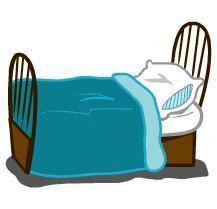 Some young children are perfectly content to sleep in their cribs or junior beds whether they are alone in a room or with siblings.
Some young children are perfectly content to sleep in their cribs or junior beds whether they are alone in a room or with siblings.
Others may go to bed in their crib or bed but wake screaming and cannot be comforted, except by getting into mommy and daddy bed and spending the rest of the night there. Still others will not even start out the night in their own bed and the only way anyone in the house is going to get a night’s sleep is if little one gets to go to sleep in mommy and daddy’s bed.
In an article written by Dr. Sears, a practicing pediatrician for over 30 years and father of eight children, he speaks to the concerns that many parents have about allowing their preschool child to sleep with them by answering a question from a reader who wrote,”Our three-year-old wakes up in the middle of the night and either demands to sleep in our bed or insists that Mommy comes sleep in her room. How can we break this habit?”
Dr. Sears answers by advising the parent that she needs to determine if her child’s desire to sleep with her is a habit or a need. He reminds parents that nighttime can be scary for little people.
If it isn’t fear that is the cause of wanting parent contact during the night time hours, than what could be the reason? Dr. Sears suggests that the need for nighttime contact may be particularly strong if a child had little or no contact with the parent(s) during the day.
The key is to find a solution that meets both a parent’s need for privacy and sleep and a child’s need for attachment and security.
Here are some suggestions Dr. Sears made for addressing the sleep situation:
- Lie down with your child in her room and parent her to sleep with a story, a back rub, and some cuddle time.
- Put a futon or mattress at the foot of your bed and explain that if she wakes up she can come and sleep in her “special bed.” Your three-year-old needs to understand the importance of not disturbing your sleep. If she needs comfort during the night, tell her to tiptoe quietly and slip into her special bed without waking mommy or daddy.
- Above all, don’t feel you are spoiling your child or that she is psychologically disturbed because she can’t sleep on her own. Many emotionally healthy children simply enjoy the nighttime security of sleeping close to their parents.
- Remember that the time your youngster spends in your room (or in your bed) is relatively short, but it encourages a positive life-long attitude about bedtime, conveying that sleep is a pleasant – rather than fearful – state to enter.
To read more of Dr. Sears advice on children’s sleep problems go to www.askdrsears.com.

